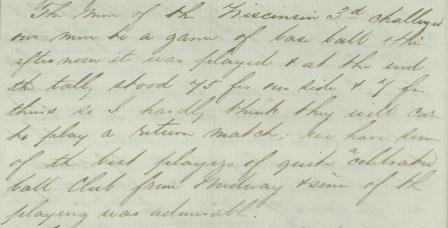By Elaine Grublin
It is always fun to make a connections in surprising places. It is even more fun when those connections are made as a result of a question asked by a visitor to the MHS.
Last week, a visitor to our current exhibition The Purchase by Blood: Massachusetts in the Civil War, 1861-1862, asked a simple question that I could not answer. The question, was Stephen Perkins — a soldier featured in the exhibition — related to the Perkins that was the namesake of the Perkins School for the Blind.
Unable to answer the questions off the cuff, I promised to research the relationship and provide an answer via email. This lead me on a serendipidious mission.
Thomas Handasyd Perkins (1764-1854) — one of Boston’s most successfull China trade merchants — was an early benefactor of the the school, selling his own home (which had housed the school for a year) and donating the funds so that the school could be moved to a larger location as enrollment grew. The MHS holds a large collection of Perkins’ personal and business papers (see a guide to the collection here), which is where I started my search. But I was unable to determine a clear familial connection between Thomas Handasyd Perkins and Stephen Perkins there. So I changed my search strategy and turned to our online catalog, ABIGAIL, for assistance.
Through ABIGAIL I discovered that the photograph of Stephen Perkins featured in our exhibtion was the only item we held credited to Perkins himself. So I kept digging through the entries for the various Perkins family members until discovering the generic subject heading “Perkins Family” which brought me to a catalog record for an item that seemed to have promise in terms of revealing a clear answer to the question at hand: a large broadside title The Perkins Family of Boston. Dashing to the stacks to view the broadside, I was delighted to see that it was a large genealogical chart which revealed there was a connection between Thomas Handasyd Perkins and Stephen G. Perkins, killed at the Battle of Cedar Mountain in the Civil War.
Looking at the chart I could see that Thomas had a brother named Samuel, who was born in 1767. Samuel had a son, who he named Stephen, in 1804. That Stephen also had a son named Stephen, born in 1835. That Stephen, the grandson of Thomas Handasyd Perkins’ brother Samuel, was the Stephen pictured in our exhibition.
I was happy to be able to reveal the answer to the exhibition visitor as well as to build for myself a little extra knowledge to share with future visitor to the MHS.



